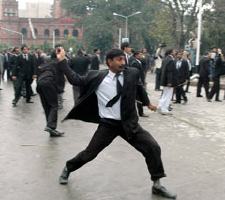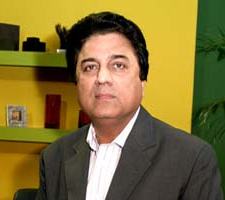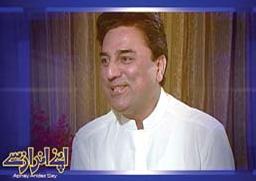Adil’s post on Kasuri incident has prompted me to recall the recent thrashing of Naeem Bokhari by his peers.


That Mr. Naeem Bokhari, documented a nasty invective against the Chief Justice of Pakistan remains a tragic event in our recent history. This letter, wittingly or unwittingly became a basis for that notoriously illegal reference against the top judge of the country. Bokhari should not have become a party to the typical power games as an officer of the court and he needs to explain much more than he already has.
What happened thereafter is all too well known to be repeated here. The apex court backed by the public opinion restored the honour of its Chief and effectively altered the destiny of this country. A new beginning was scripted by the citizenry with immense faith in the Constitution and  its guardians. Never has the predatory executive suffered such a blow in Pakistan’s turbulent history. Ordinary, unlettered Pakistanis, joined in to conclude that due process was something intrinsic, vital and non-negotiable. Exactly after a week the Lord Chief Justice was reinstated by his brothers, while addressing a seminar, he noted:
its guardians. Never has the predatory executive suffered such a blow in Pakistan’s turbulent history. Ordinary, unlettered Pakistanis, joined in to conclude that due process was something intrinsic, vital and non-negotiable. Exactly after a week the Lord Chief Justice was reinstated by his brothers, while addressing a seminar, he noted:
“The last four months in our national history have changed something forever. I feel proud to say that not only the judiciary and 90,000-plus black-coated fraternity, but the entire civil society is ready to sacrifice everything to uphold the Constitution and achieve rule of law…”
A few days later, we read the news that Bokhari was manhandled by his ‘black-coated’ fraternity when he re-appeared in the Courts after a long break. Naeem Bokhari broke the silence and wrote in The News on what exactly transpired on that fateful day when the Rawalpindi lawyers’ “fury” resulted in his humiliation and ruthless thrashing. Bokhari’s license was canceled during the lawyers’ movement and later a High Court Judge had suspended that decision. However, when Bokhari tried to argue in a Rawalpindi Court, the secretary of the Rawalpindi Bar stated that the High Court order had been “passed by a Shia judge, who according to another lawyer was a tout.” Later, some of the lawyers were ready to strip him naked and thrash. The police intervened in this process but according to Bokhari the lawyers wanted his “physical custody.”
Bokhari painted a harrowing picture of his treatment. He alleges that he was “forcibly pushed out of the courtroom and hit on the head again and again.” At the end of this mob frenzy, Bokhari and his associate were severely beaten. Symbolically Bokhari’s coat was snatched and his shirt was torn. Humiliating as it is, the whole incident is reminiscent of tribal notions of justice.
While the misgivings against the perceived collaborators of the executive may be justified, such abusive treatment is not. It is plainly out of the ambit of the laws and code of conduct under which the legal profession is regulated. In fact, such incidents can taint the heroic image that the lawyers’ bodies have earned through their relentless, spectacular struggle.
 Having said that, Bokhari’s contention is a little shaky that he will not apologize for his letter for which he considers “answerable to the court, not to any mob.” He is definitely not accountable to mobs but his letter was neither benign nor factually correct.
Having said that, Bokhari’s contention is a little shaky that he will not apologize for his letter for which he considers “answerable to the court, not to any mob.” He is definitely not accountable to mobs but his letter was neither benign nor factually correct.
Now that the legal fraternity has won its prime battle and an independent Supreme Court and political process will tackle country’s quagmire, it is time that the Bar leaders should pay attention to the long-neglected issues concerning regulation and internal accountability of the legal profession.
The state of legal education barring a few elite institutions mirrors the general collapse of the education system. Bar Councils hold uneven entry examinations and relaxed entry policy is doing more harm than good to the profession. Countries such as Malaysia, India and Sri Lanka have improved legal education and Bar-entry examinations. We are lagging behind in this respect; and resultantly the quality of entrants is not the best. Similarly, action against erring lawyers is not always certain as the politics and electoral prowess of Bar subgroups (often organized along the lines of caste or sect) impede the process. These issues are well known to the legal community and they have the best solutions to correct this situation. This is the best time for the Bar leaders to take tough decisions to reform the way their profession is regulated.
If Bokhari’s story is true, then to uphold professional reputation and ethics, the Bar should question the members of fraternity who handled their “foes” – Bokhari and Kasuri among others – in a feudal manner. Would it be too much to ask that the Supreme Court should take suo moto notice of this incident and reaffirm that it is the ultimate guardian of constitutional rights and that it will not let its law-officers, especially in their name, behave the way an unaccountable executive governs.
And, Mr Bokahri, will have to set the record straight and apologize to the Court for unduly scandalizing the highest officer holder of the judiciary.
Raza Rumi blogs at Jahane Rumi



















































“Would it be too much to ask that the Supreme Court should take suo moto notice of this incident and reaffirm that it is the ultimate guardian of constitutional rights and that it will not let its law-officers, especially in their name, behave the way an unaccountable executive governs.”
a pertinent suggestion!
Adil, I guess the last comment proves your point from the last post. The argument is always the same: because someone else is worse so I have a right to be bad. Odd logic, I can act badly becasue others even even worse than me!
Those who preach violence for their cause end up validating violence against them.
what is with the nonstop sympathy for treacherous scum like Bohkari and Kasuri? is decency and class only required of us? what about the “government” and the establishment? do the military and its innumerable chamchas also need to respect any norms observed in civilized societies?
Bokhari wrote that letter because he was paid off by our brave generals. Kasuri is charging millions for his “legal” services. these two are tools of this dictatorship. they are part of the process being used to subvert the political and democratic will of the people of Pakistan. effectively, they are part of Musharraf’s treason. any punishment they get is too little to my mind. Bokhari deserves much more than a beating and having his shirt torn off. Kasuri deserves much more than just black paint on his face.
btw, why aren’t there posts condemning the murder of Hammad Raza here? he was killed by the “government”. it was a state-ordained murder in cold blood. his blood is on the hands of the dictator general. what about Raja Riaz? he was murdered by more “government” thugs – God bless MQM. who will give him and his family justice? both were good men – killed because they stood up against the army and its “government”.
people cry about beatings and black paint. Bokhari didn’t die because of the beating. Kasuri didn’t die because of the black paint. Raja Riaz died. Hammad Raza died. why? because they were against the “government” that traitors like Bokharis, Kasuris and Pirzadas help prop up every time a military dictator decides that he wants to install himself as zill-e-elahi for life.
if the courts, etc will not take action against enablers of dictatorships like Bokhari, Kasuri and Pirzada, then people will. they are traitors who sell out to any general that comes to the fore. any punishment they get is too little.
the rules of civilized behaviour and fair play were abandoned a long time ago. one party can’t be expected to hold itself to saint-like standards while the military and its instruments conduct themselves like the criminals and murderers that they are.
Naeem Boukhari belongs to the same judiciary system as that
of CJ, they all belong to that vicinity which can be as unpredictable as the President. God save the jura !!
perhaps the exalted judicery is not so exalted after all !!
they are from amongst us … they err as we do so lets not try looking for demi gods to set us right. As a nation, only we ourselves can set ourselves on the right path.